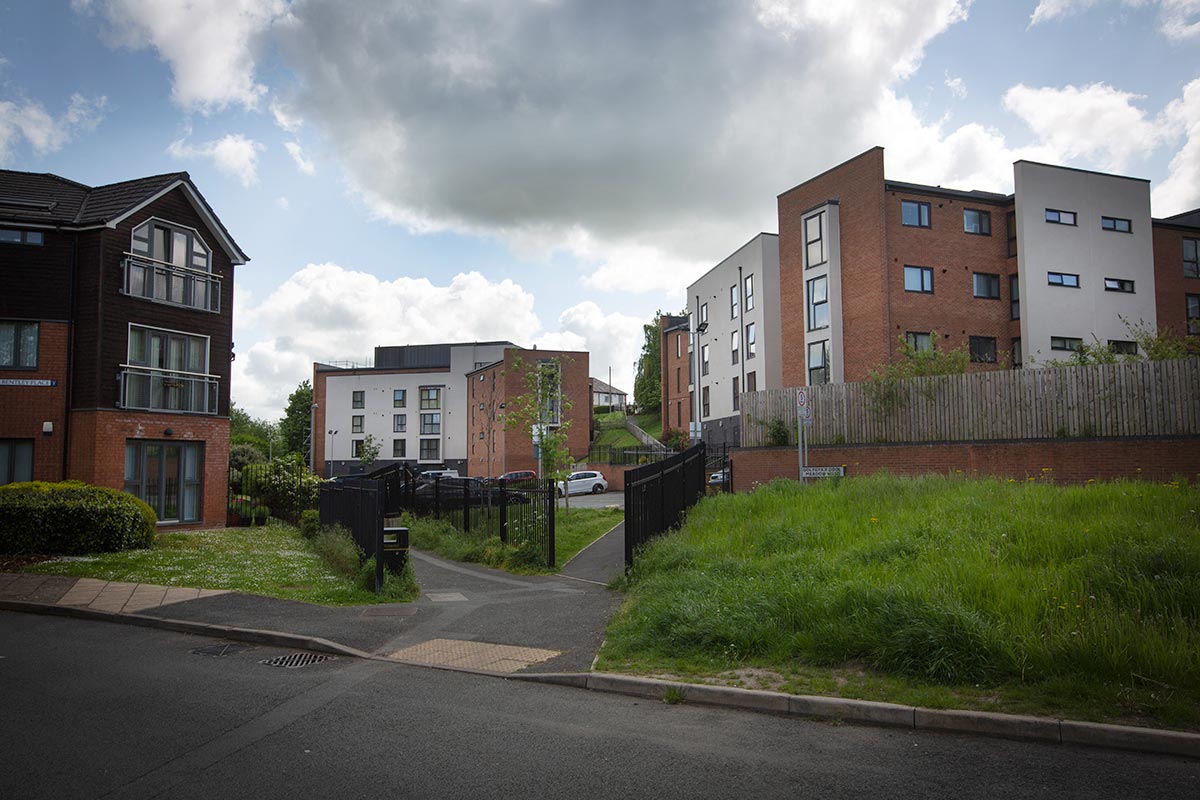How one landlord is changing its approach to anti-social behaviour
ClwydAlyn is shifting away from punitive measures and focusing on prevention. Faima Bakar evaluates its new approach. Photography by Colin McPherson

The housing sector is trying to reset its relationship with tenants. To stop stigma for social housing residents. To ensure tenants are treated with respect. But where does anti-social behaviour fit into this reset? Is the sector’s approach right? Or does it need adjusting?
One housing association has come to the conclusion that the answer to that last question is yes, it does need a rethink.
ClwydAlyn in Wales has scrapped its old approach to anti-social behaviour, one shared by much of the sector. In August 2021, the 6,000-home association replaced its two anti-social behaviour officers with three early-intervention officers. These completely new posts aim to take a preventative, instead of a punitive, approach.
While the new early-intervention officers are dealing with the same issues anti-social behaviour teams used to – from noise disturbances and parking issues, to more severe problems involving drugs and violence – the approach is very different.
Inside Housing went to Wales to explore how the housing association’s approach works and whether it could provide a template for others looking to change the way they operate.
The attitude to anti-social behaviour has, if anything, been hardening on the national political stage. Sir Keir Starmer, the leader of the Labour Party, recently called it a “virus” and accused the Conservatives of being soft on anti-social behaviour. He promised that, if elected, the party would introduce 13,000 extra police and launch ‘respect orders’ “with teeth”.
Partnership working
ClwydAlyn’s approach takes a different tone. Brendan McWhinnie, a team manager who has worked at ClwydAlyn for more than 20 years, says: “The approach to anti-social behaviour was very punitive, but we wanted to do something more in line with our values and how we wanted to interact with our residents,” he says.
“As an organisation, we want to be clear: we want people to be happy; to live in a happy and safe environment. We will deal with matters, should they need to be addressed. But above all, we wanted to go back to our basic principles of trust and openness.”
Before the change in 2021, he says ClwydAlyn would focus on taking robust action against anti-social behaviour when it cropped up. The difference now is that the team tries to deal with the situation before it escalates. ClwydAlyn has not evicted anyone as a result of problematic behaviour since it implemented its early-intervention officers in 2021.
The early-intervention officers sit in a team alongside housing officers and specialist welfare and income officers. The team “can tackle anything that needs that first-line support. We’ve identified support issues – maybe rent issues, a management issue, or assisting with the submission of a benefit claim,” Mr McWhinnie says.
There are some instances where the police have to be involved, and ClwydAlyn has formed a partnership with the local force.
“One of the things we tasked teams with was getting to know the local policing teams that work there. We also try to form effective partnerships with student, family and adult services; we don’t work in isolation,” Mr McWhinnie says.
“What we encourage is bringing the police in at an early stage, from a preventative, rather than an enforcement point of view. This is helped by the local police having a relationship with the community. We also invite the police to events such as community days, so their presence is natural.
“There may be times when we have to escalate [a situation] and the police are called upon to take action, but we don’t hide from our residents that we work with the police to make the community safer,” he says.
So what happens if residents’ anti-social behaviour persists and they are undeterred by ClwydAlyn’s efforts? The housing associations says that despite misconceptions about the youthful nature of anti-social behaviour (popularised by the ‘ASBO teen’ label given to young people in the early 2000s), it exists on a spectrum and can often be displayed by an older demographic, who might have more conviction in their beliefs and attitudes. But, again, ClwydAlyn works to understand people’s needs and get to the root causes of their actions.
Mr McWhinnie recalls a case of anti-social behaviour that was labelled arson, which is a criminal offence. In reality, a tenant’s barbecue had caught fire and set a tree alight. The housing association de-escalated the situation by removing the term ‘arson’ from the case.
“This is not a case of us taking the softer approach,” says Mr McWhinnie.
ClwydAlyn might issue people with a resident contract, instead of slapping them with an ASB order, whereby they and the accused resident set up clear objectives and timescales to rectify an issue. So, for example, in the case of a low-level resident concern such as an unkept garden, ClwydAlyn may agree with the resident what needs to be undertaken to bring the garden to a satisfactory standard. ClwydAlyn will then provide the resources to achieve this, so in the above example, a skip may be provided. But, crucially, the team would work to understand why the situation occurred in the first place.
That does not mean ClwydAlyn has done away completely with court orders and injunctions, though. These are usually administered only when interventions have failed. The team ensures it has fully considered all aspects of the case before commencing action; it undertakes a detailed case review and consults with local partners (such as the local authority and the police) on the need for further action to be taken. This is usually a last resort.
In another case, a resident was demonstrating behaviour that was being perceived by other residents to be inappropriate and threatening. ClwydAlyn engaged with the accused resident and established a rapport. This was supported by a resident agreement which resulted in follow-up visits by the local housing office, early-intervention officer and their team manager. The intervention was further supported by the local policing team who issued a Community Protection Notice to run alongside the resident agreement. ClwydAlyn also met with other residents to address concerns and to ensure that the accused resident was not isolated. The outcome was that there have been no further concerns reported and the community is currently settled in respect of this issue.
Early intervention
Not all cases of anti-social behaviour are straightforward, especially in situations involving mental health issues. ClwydAlyn has a mental health team within its operation which works effectively with residents, navigating the support they need and making any necessary referrals.
Rebecca Topping, a housing officer who has worked at ClwydAlyn for six years, is one of the early-intervention officers. Her role is varied. She supports people with referrals, with rent and day-to-day concerns. She tells Inside Housing: “You get to help and support a lot of people.”
Ms Topping and Helen Jones, an income officer who has worked at ClwydAlyn for 20 years, are always on hand to deal with residents. Some residents find it more comfortable to chat via text, for example, when discussing rent arrears.
“What we do is really early intervention, because if these sorts of issues are picked up as early as possible and identified, not just with new tenants, but even as early as when [someone is] allocated a property, then we can identify if a person is vulnerable and is going to need a little bit of help getting set up, sorting their utilities, getting on to Universal Credit and getting their housing benefits sorted,” Ms Jones says.
“It’s critical that we do that right from the beginning to make sure they get off on the right foot. In the past, it’s just been, ‘Move in, that’s it, get on with it’,” she says.
As housing officers who deal with anti-social behaviour, their remit is vast. They can help with Discretionary Housing Payments, make sure residents are aware of support, such as food and meal vouchers, and work with the police to help victims of crime or those perpetuating anti-social behaviour.
“The North Wales police are very good. They’ll come and do visits with us, because sometimes I find that having them there means residents know their actions have been more serious and they’re being taken seriously,” Ms Topping says.
Despite their best efforts, not all anti-social behaviour can be resolved – some tenants may be persistent in their actions. But the landlord has found this method to be better than punishment, such as fines and anti-social behaviour injunctions, which tend to reinforce negative behaviour.
Ms Topping adds: “We’ve taken away punitive measures, because it works better [not to use them]. Understanding and treating anti-social behaviour like it’s not all black and white helps resolve it. I sit down and listen to all parties, and offer different [options to resolve the situation].
“Without talking to them, you don’t know if there is a reason why a person is kicking off, or why issues occurred. They might need a bit of support in their daily life and are taking those frustrations out [elsewhere]. We can then tailor our services to what they need,” she says.
While their initial findings are positive, these new interventionist policies are still in their infancy. For the time being though, both staff and residents seem hopeful that this approach will tackle anti-social behaviour once and for all.
Sign up for our Wales newsletter
New to Inside Housing? Click here to register and receive our Wales round-up straight to your inbox
Already have an account? Click here to manage your newsletters











